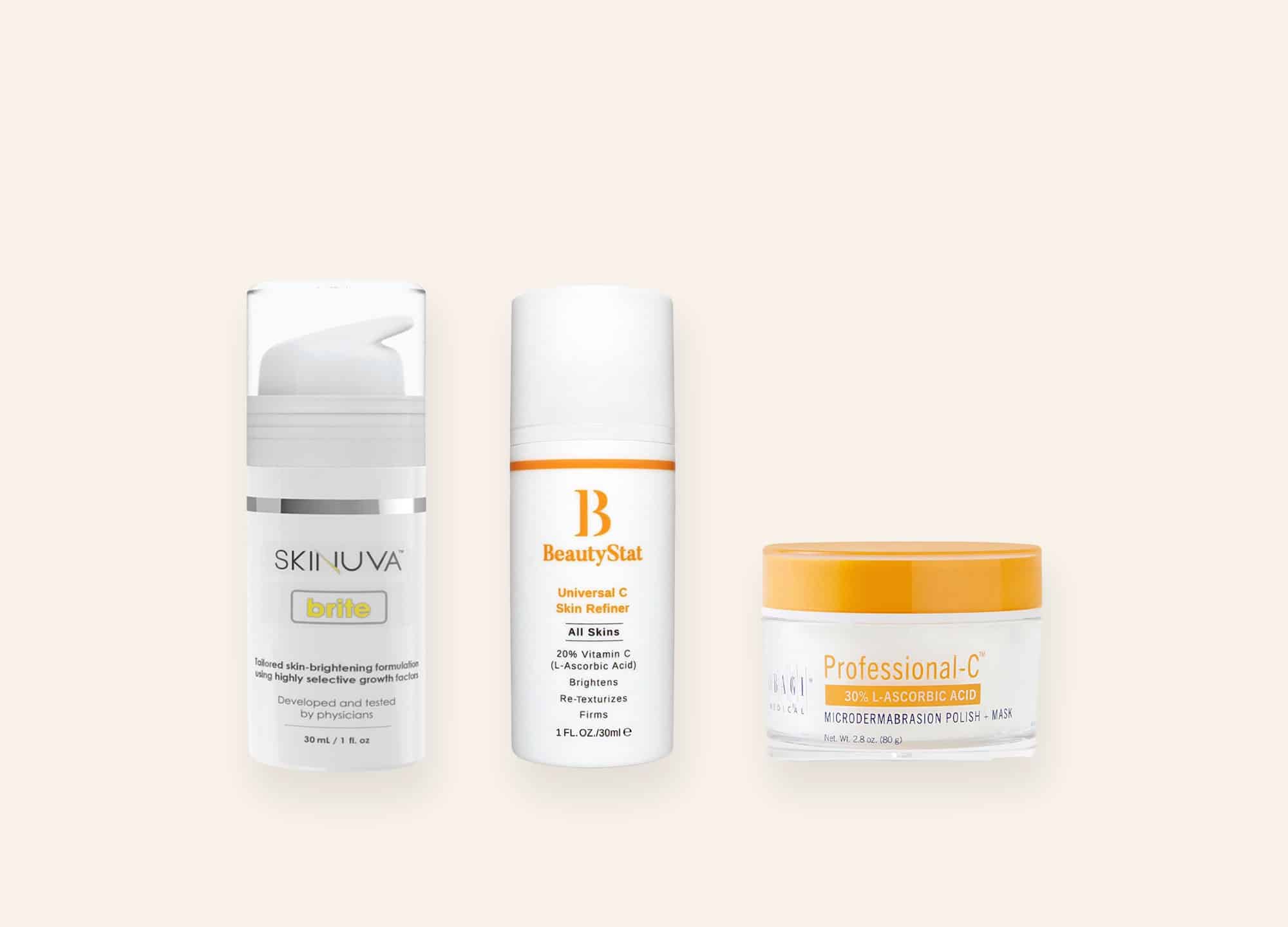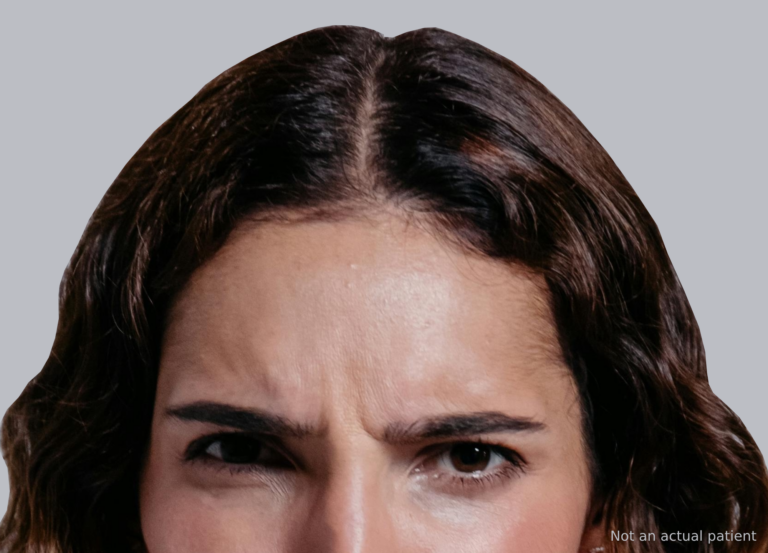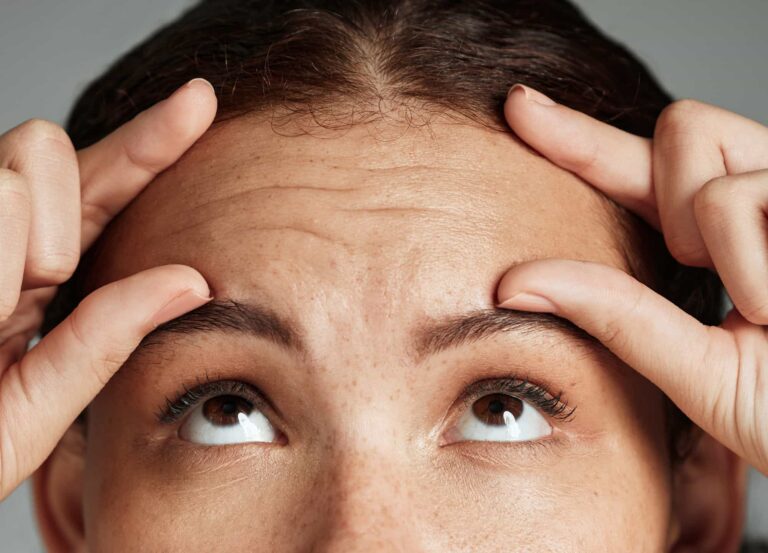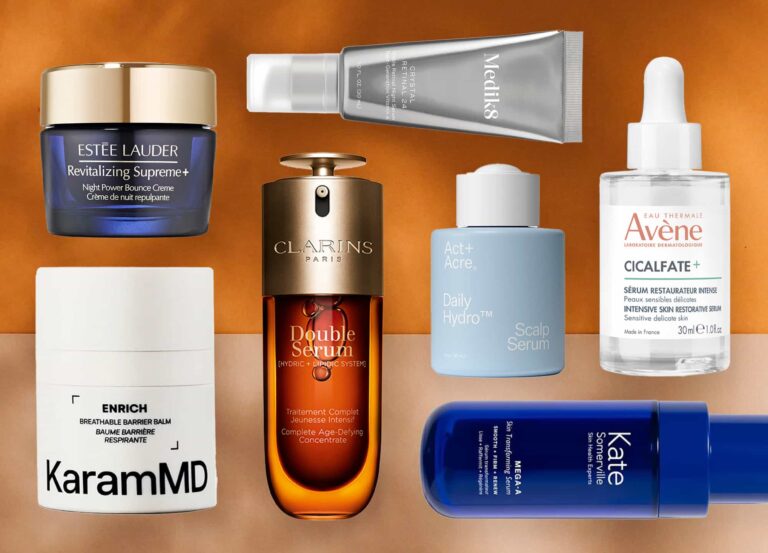Vitamin C is a skin-care triple threat, a favorite among dermatologists. So, exactly what does vitamin C do for your face? “Vitamin C is a powerful antioxidant that also lightens discoloration and helps smooth fine lines,” explains Dr. Jennifer Reichel, a board-certified dermatologist in Seattle. By neutralizing free radicals (caused by exposure to environmental factors such as UV rays and pollution), it helps to prevent and reduce skin cell damage, she says. As far as brightening goes, vitamin C works in two different ways. Dr. Reichel notes that, because vitamin C is actually an acid, it does have a mild exfoliating effect that helps to fade existing discoloration. But it’s also a choice ingredient to keep new spots from forming: “Vitamin C inhibits the production of tyrosinase, an enzyme critical for the production of melanin, or pigment,” explains Dr. Emily Arch, a board-certified dermatologist in Chicago. In addition, she adds, the vitamin both increases collagen production and prevents the breakdown of collagen and elastin via its antioxidant properties, making it an effective wrinkle fighter.
In short, vitamin C is a highly effective multitasker that targets a number of different complexion concerns and is undoubtedly worth incorporating into any skin-care routine. But it’s not quite so simple. There are a few important points to consider when choosing—and using—vitamin C skin-careproducts. Here’s what you need to know.
Related: 5 Things to Know Before You Buy Retinol, According to Derms
1. Not all forms of vitamin C are created equal.
Just as there are different types of retinoids, so too are there many different types of vitamin C. Experts tend to agree that L-ascorbic acid is the most potent and most effective of them all. It’s the most biologically active, meaning that your skin can immediately use it, says Dr. Arch. Sounds good, right? It is, but there are a few big caveats. L-ascorbic acid is, notoriously, the most unstable of all the vitamin C variants, easily degraded by exposure to light, air, and heat, she says. And though it can penetrate the skin quite well, that’s only when it’s formulated in a product with an acidic pH of about 3.2, explains New York City board-certified dermatologist Dr. Sheryl D. Clark. But that acidic pH correlates with an increased likelihood of irritation, particularly for those with sensitive skin. And finally, because L-ascorbic acid is water-soluble, it’s most effective when found in serums rather than in creams or moisturizers. (For this reason, when it comes to vitamin c skin care, serums will always give you the most bang for your buck.)
Alternatives to L-ascorbic acid include THD ascorbate, a fairly new ingredient that isn’t pH-dependent and, as such, is much easier to formulate with, use, and layer with other products, notes Dr. Clark. The other benefit? It’s fat-soluble, meaning it can be incorporated into products that are oil-based, such as creams and masks.
Magnesium ascorbyl phosphate and sodium ascorbyl phosphate are two other vitamin C derivatives, both of which undergo a conversion process in the skin and ultimately turn into L-ascorbic acid. Both are water-soluble (so, again, look for them in serums rather than in lotions or creams). They’re less potent but are, therefore, less likely to cause irritation—a worthwhile choice for those with sensitive skin, suggests Dr. Reichel.
Derm product recommendation: the one-stop-shop serum
iS clinical Super Serum Advance Plus ($155)
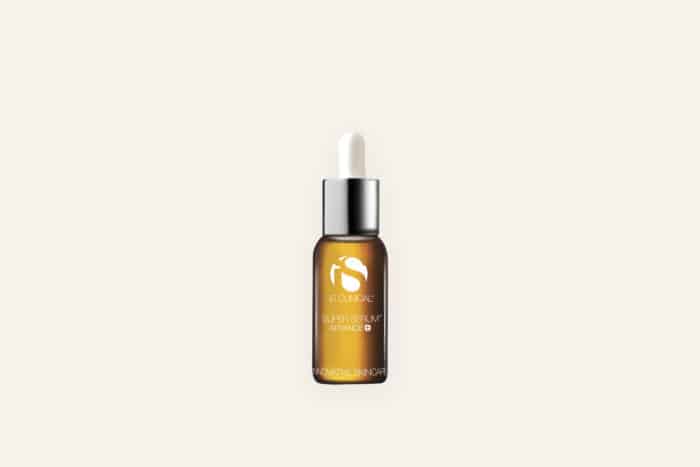
This serum contains time-released L-ascorbic acid (while the percentage isn’t disclosed, it is the second ingredient listed). It’s paired with additional antioxidants plus arbutin, for an extra brightening boost, and touts hydrating hyaluronic acid and glycerin as well.
Derm product recommendation: the gateway cleanser
Obagi C- Rx C-Cleansing Gel ($43)
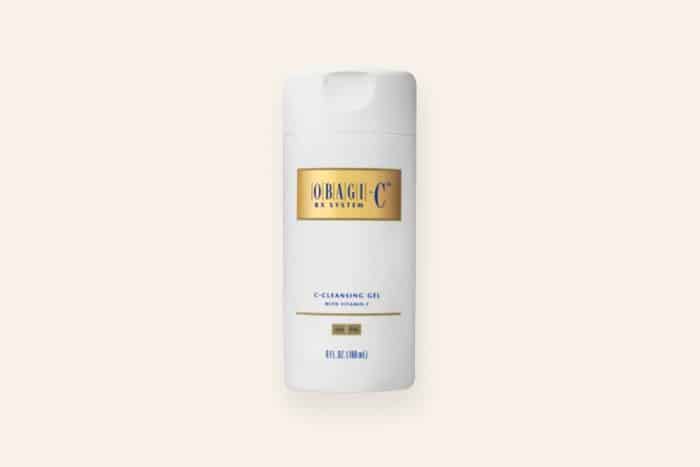
Yes, derms unanimously agree that using a serum is the best way to reap the benefits of vitamin C. That being said, it can be too intense for those with more sensitive skin, which is where this vitamin C-based cleanser comes in. It contains potent L-ascorbic acid, but because it’s not in contact with your skin for that long before it’s rinsed off, the risk of irritation is reduced. In short, it’s a great way to still get some of the benefits of vitamin C and/or help your skin gradually acclimate to the powerful ingredient.
2. Read the ingredients label carefully.
Along with understanding which type of vitamin C you’re getting, you’ll also want to consider the concentration. “Vitamin C products tend to come in 5%, 10%, 15%, and 20% concentrations, but I recommend starting at 10% and gradually increasing, as tolerated,” advises Dr. Reichel. Dr. Clark agrees, noting that 10% is a good lower limit to ensure quality efficacy. And while it’s usually products with L-ascorbic acid that specify the concentration, the same guidelines apply to all the aforementioned variants of vitamin C, says Dr. Arch. If the percentage isn’t specified, you’ll want to make sure that vitamin C is one of the first three or four ingredients listed in order for it to be worth the cost, she adds. (More on the price factor in a moment.)
Derm product recommendation: the heavy hitter
Obagi Professional C-Serum ($127)
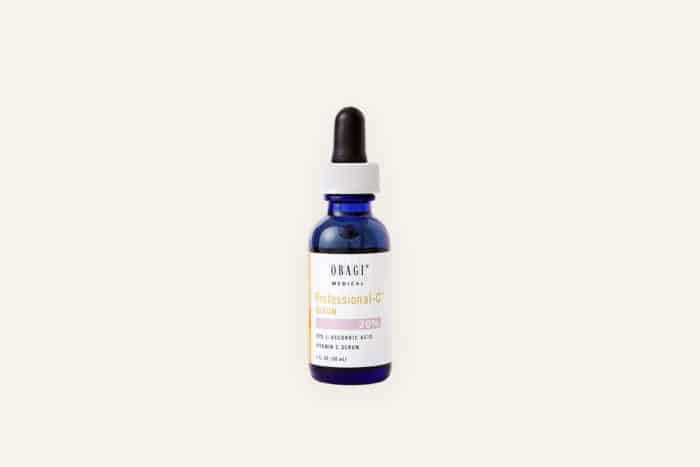
If you want a hefty dose of vitamin C and vitamin C alone, this pro-grade serum can’t be beat. The only active ingredient is L-ascorbic acid, at an impressive 20% concentration—the highest available. (Heads up: this is superpotent, so steer clear if your skin is dry or sensitive.) However, there is a lower, 15% concentration available.
Derm product recommendation: the do-it-all youth-booster
BeautyStat Universal C Skin Refiner ($80)
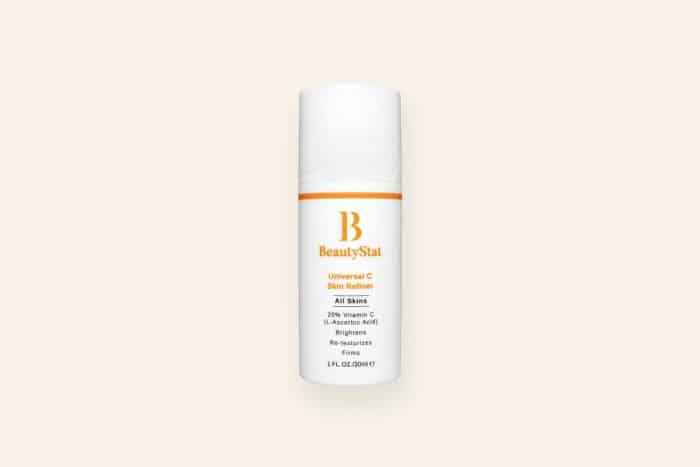
When it comes to vitamin C skin care, the exact formulation matters—a lot. This serum is the hero product of a brand created by a cosmetic chemist, so you know the ingredient combos are going to be legit. More specifically, there’s 20% L-ascorbic acid, coupled with tartaric acid; the latter optimizes the pH level for maximum absorption. Also in the mix is an antioxidant-rich green tea extract and hydrating squalane, making this formula great for firming, brightening, and tightening skin.
3. Packaging matters—a lot.
While L-ascorbic acid is the most unstable, all forms of vitamin C are somewhat susceptible to degradation when exposed to light and air. The universal rule of thumb—for any type of vitamin C product—is to make sure it’s housed in a dark, opaque glass bottle, advises Dr. Reichel. (Airtight pumps and droppers are also preferable to screw-top jars.) Also, make sure to store any and all vitamin C skin care in a closed cabinet or drawer, away from heat and light.
Derm product recommendation: the potent antioxidant serum that anyone can use
Revision Skincare C+ Correcting Complex 30% ($160)
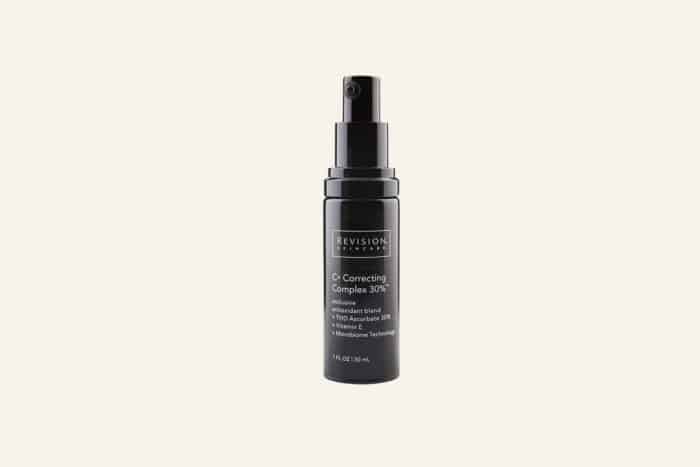
Along with a powerful dose of THD ascorbate (the new vitamin C derivative that earns big points for both stability and efficacy), there are a litany of other antioxidants in this formula. Because it doesn’t contain L-ascorbic acid, the likelihood of irritation is reduced, making this a smart pick for all skin types.
Derm product recommendation: the anti-aging eye cream
BeautyStat Universal C Eye Perfector ($65)
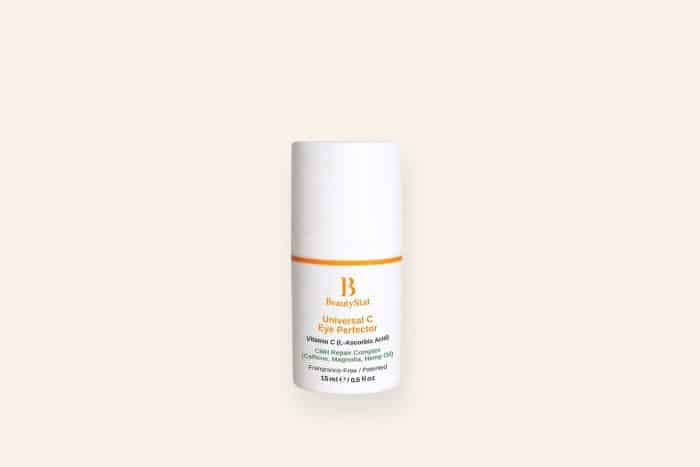
We’ve talked a lot about the options for the best vitamin C serum for the face overall, but the skin around your eyes can also benefit from what vitamin C has to offer. Antioxidant protection, brightening benefits, more collagen production—all of these are major wins for the eye area. Still, because this skin is fragile and thin, you’ll definitely want to look for the ingredient in a dedicated eye cream in order to minimize the likelihood of irritation. This one fits the bill, thanks to a 5% concentration of L-ascorbic acid, an antioxidant-rich green tea extract, and a complex of anti-inflammatory ingredients that soothe and combat puffiness.
4. Price matters too.
While the “you get what you pay for” principle doesn’t always apply to skin care, it does when you’re talking about vitamin C. The hard truth of the matter is that an effective product that’s well-formulated, particularly if it’s using L-ascorbic acid rather than a different version, is likely going to be pricey. “It’s expensive to manufacture vitamin C products properly,” points out Dr. Clark. But here’s some good news for your wallet: “Vitamin C has been shown to remain active as an antioxidant for up to 72 hours,” says Dr. Arch. If you’re using it for brightening or wrinkle-fighting purposes, it’s still best to use vitamin C daily. But if you’re after the antioxidant effects, you can easily get away with using your pricey product every other day. Keep in mind that while the vitamin C derivatives aren’t as effective, they are usually much more affordable.
Derm product recommendation: the affordable pick
TruSkin Vitamin C Serum ($36)
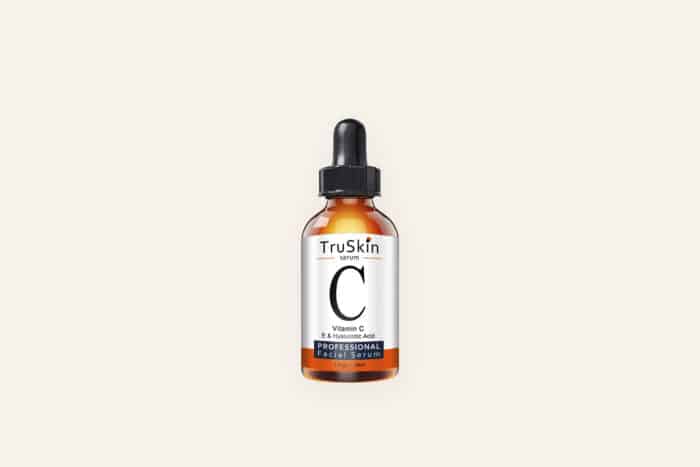
Because this contains sodium ascorbyl phosphate, it rings in at a notably lower price point than many other vitamin C serums. Still, it does offer good antioxidant benefits—particularly because there’s also vitamin E in the mix—and has a pleasantly hydrating texture.
Derm product recommendation: the two-in-one brightener
Obagi Professional-C Microdermabrasion Polish + Mask ($83)
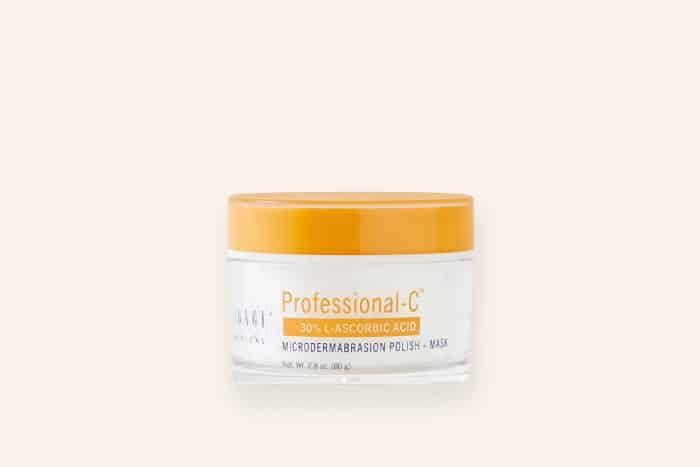
If you’re after the brightening benefits ofvitamin C, consider looking for it in an exfoliating product, such as this one. Thanks to the combination of ultrafine polishing crystals and a whopping 30% concentration of L-ascorbic acid, you’re getting physical exfoliation along with the chemical exfoliation and spot-inhibiting benefits of vitamin C. Use the product two to three times weekly and leave it on for 10 to 15 minutes, depending on how sensitive your skin is.
5. It plays nice with some—but not all—ingredients.
Other antioxidants—specifically, vitamin E and ferulic acid—are vitamin C’s best friends and work synergistically with it, says Dr. Reichel. But beyond antioxidants, it’s a good idea to choose products with short ingredients lists, especially when dealing with L-ascorbic acid. The more ingredients in a formula, the less likely it is to be at the acidic pH vitamin C needs in order to penetrate and be effective, says Dr. Clark. Speaking of which, avoid using your retinoid and vitamin C products in tandem; retinoids work better at a higher pH, and the discrepancy between the two can render both actives inactive. Reserve vitamin C skin-careproducts for a.m. use (the ingredient is ideal for layering under sunscreen as a second layer of protection) and retinoids for nightime.
Derm product recommendation: the cult classic
SkinCeuticals C E Ferulic ($166)
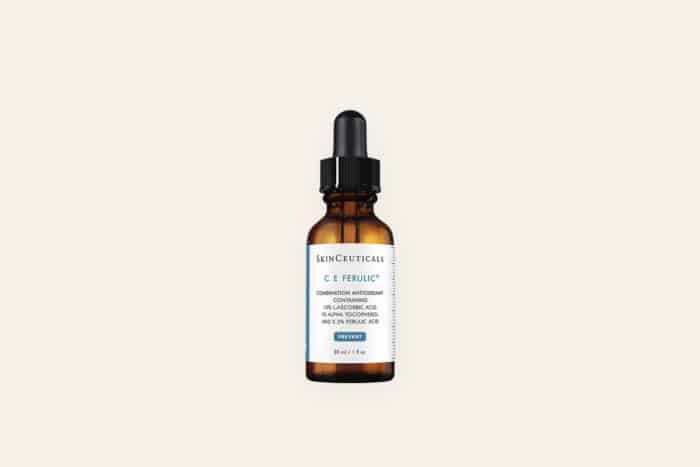
Determining which is the best vitamin C serum is tough, and to a certain extent depends on your particular skin type. But this one is undoubtedly a universal crowd-pleaser; good luck finding a derm who doesn’t love and rave about this serum. There’s good reason it’s such a fan favorite—namely, the trifecta of 15% L-ascorbic acid, 1% vitamin E, and 0.5% ferulic acid. The combo offers outstanding antioxidant benefits, making this formula an OG staple in the skin-care industry.
Derm product recommendation: the stubborn spot fighter
Skinuva Brite ($85)
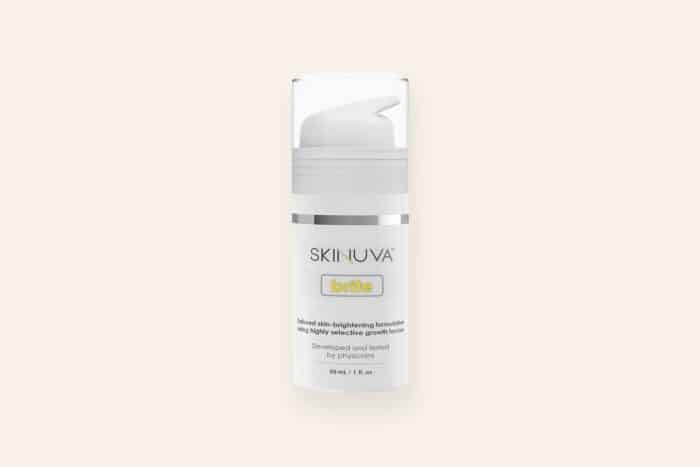
Even the most stubborn dark marks don’t stand a chance against this powerful brightening treatment. Vitamin C is just one ingredient in a laundry list of additional spot-fading actives, including tranexamic acid, niacinamide, and arbutin. Also nice: it’s pregnancy-safe, great for moms-to-be battling hormone-induced melasma.
Derm product recommendation: the P.M. Powerhouse
Rodan + Fields Reverse Tone Correcting Treatment ($110)
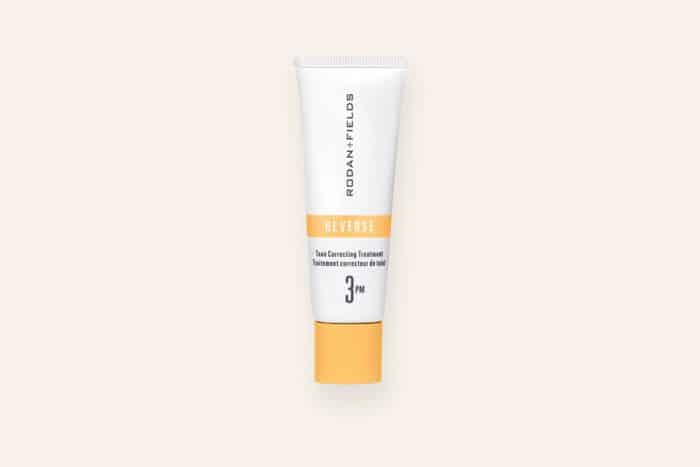
As a general rule of thumb, you should save vitamin C for morning use and retinoids for nighttime use, but this is the exception to the rule. It’s specially formulated to combine 10% vitamin C (in the form of ascorbyl glucoside) with two types of gentler retinoids, retinal and retinyl palmitate. The end result? An effective brightener that can, and should, be used before bed. Top tip: start by using it every other night, for the first week, gradually increasing the frequency as your skin acclimates to the potent combo of ingredients.







